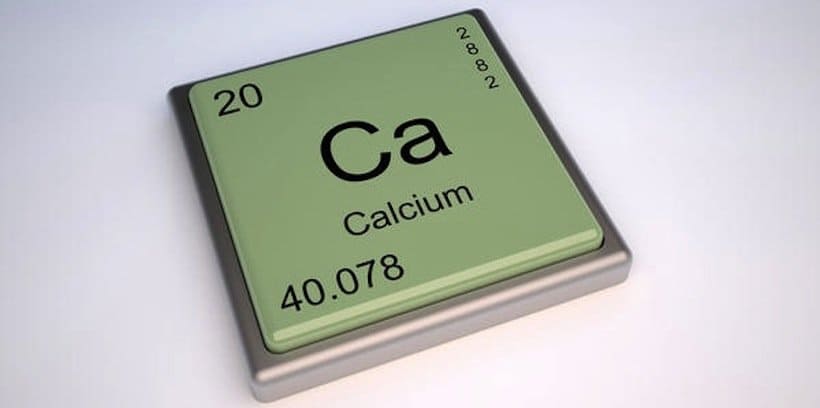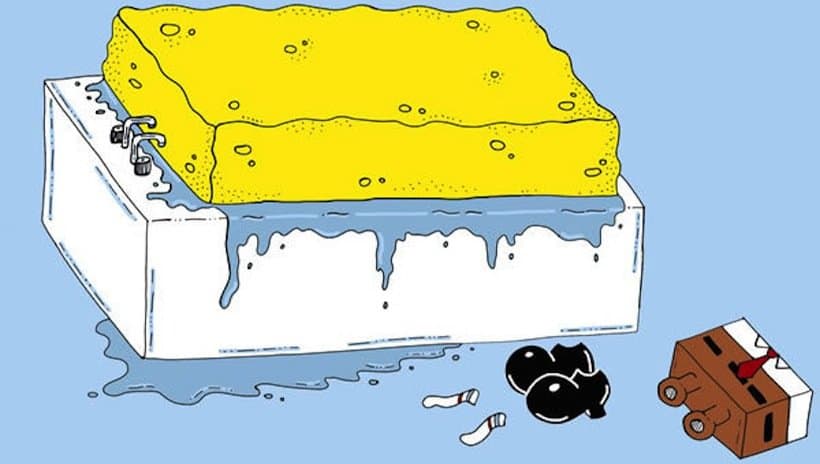Many people are beginning to discover, and are intrigued by a new type of calcium supplement that is made entirely from plants. It is called AlgaeCal and it is the only plant calcium supplement on the market sourced from South American USDA Certified Organic marine algaes.
The sales of this plant calcium are beginning to challenge traditional blue chip calcium products, like those made from calcium citrate.
Why? Because the public is becoming aware that traditional calcium products (like calcium citrate) are made from rock.
And once you find out that you can choose between eating plants versus rocks, which would YOU choose? Exactly!
Let’s say, for some reason, you still chose rocks over plants… Would you reconsider if you knew that plant calcium is the only calcium clinically supported to increase your bone density? (1)
Read on to learn how AlgaeCal compares to calcium citrate.

Calcium Citrate: The Fine Print
The most important point to know about any calcium is what it does for your bone health. And, supplements made from calcium citrate only slow down bone loss. (2)
Until plant calcium was studied and introduced around 2005, slowing bone loss with rock derived citrate was considered the best we could hope for. But, despite the advances of plant calcium increasing bone density, it presently is still “little David” compared to “rock calcium Goliath”.
And “Goliath” spends many millions on advertising and marketing to convince you theirs is better than any competitor, so they can retain the market share they have enjoyed for decades.
Citrate’s Humble Beginnings
Calcium citrate is an ingredient that begins its journey in open pit limestone mines. These giant slabs are crushed, superheated then water is added to produce ‘slaked lime’. This is ‘reacted’ with citric acid in a chemical process that produces calcium citrate. (3)
Calcium citrate has become the main ingredient in some popular calcium products, like CitraCal due to some advantages. Let’s see what the benefits of it are and how it compares to plant sourced calcium.

Features of Calcium Citrate
Calcium citrate is 20% elemental calcium – this is lower than plant calcium from algaes at 30%, but it does have some other advantages:
- Citrate is highly absorbable and causes less side effects (like bloating and constipation) than typical calcium carbonate does. This increases customer compliance, which is a component of efficacy: because if the buyer finds a reason to not take the product, it will never be effective.
- Citrate can be taken on an empty stomach– which is a feature that also increases customer compliance, thus efficacy.
Most typical calcium pills must be swallowed with meals, to benefit from the stomach acid you produce during digestion. (4)
Compliance (therefore efficacy) increases if you can take your supplements any old time.
As you age, your ability to produce stomach acids goes down, so your food (or supplements) doesn’t break down as well. This reduces your absorption rate, which impacts the number of vitamins and minerals you actually receive.
So two people eating the same food, or calcium supplement, will extract and utilize different amounts of calcium from it. (5)
Citrate, therefore, is recommended for older people who have trouble digesting.

But Is It Effective?
As you can see, calcium citrate has some perks – but in the end it only slows down your bone loss.
No way around it. If you spend more than you make, you will go bankrupt; AND, if you lose more bone than you make, you will eventually get osteoporosis.
It’s important to understand that you naturally lose about 1% of bone – every year – after about 35 years of age. Citrate-based products reduce that so you lose only 0.5% every year – which IS better than taking no calcium supplement at all. It will delay the onset of osteoporosis.
We buy calcium supplements primarily to help our bone density and avoid thin, porous bones. If you have been diagnosed with low bone density, or if you are middle age or older, then how a product affects your bone density (as measured by a DEXA test) is the number one selling point.
ALL mainstream products like calcium citrate (as well as carbonate, coral, eggshell, and cattle bone sourced calcium products) have the same result on the pivotal issue of bone density. They all only slow your decline by the same amount.
So the companies joust in ads and on labels and try to “outdo” each other on secondary points like absorption, tolerability, price and convenience.
The Absorption Red Herring
It may be hard to absorb, but if your first concern is absorption when shopping for calcium, you’ve been the victim of a red herring.
That’s right – it’s just a marketing distraction that the high absorption of calcium citrate is promoted at the expense of the ‘main event’, bone density.
Why? Because absorption is treated as if it’s the most important quality of a calcium supplement. You’ve been led to believe that absorption rates equal efficacy. It seems to have some intuitive merit, and that’s the assumption that’s made.
Studies show: the best absorbed calciums do not have the best effect on your bone density. (5)
The absorption issue is an example of the power of suggestion.
Similar to beer companies that always have beautiful people in their ads. They never say it outright, and don’t have to, because naturally, we make the leap in our minds that if we buy that brand, we too will have the beautiful people around us!
So you’re not alone if you have made the assumption that the most absorbed calcium equals the most effective. That was the exact intention. And it was the advertisers’ purpose in getting you to buy their product.

Absorption- Just One Link in a Chain
There are several features that must be present in a calcium supplement for it to be considered the most effective. Absorption is important because if a calcium tablet can’t be absorbed at all, then, of course, you are wasting your money.
The facts are – all calciums absorb between 25-35%.(6)
So you might think ‘Ok, I should buy the one that is 35%.’
The problem is the one that is 35% absorbed often doesn’t have all the features that other products do.
Imagine when you shop for a car, mileage is just one of many requirements you may have. Safety, capacity, and how it makes you feel are a few popular requirements you likely have as well. The car you buy will have the best balance of all your needs. A car that excels at one thing but fails in the other categories is a car I bet you would avoid.
And so it is with calcium supplements, too.
That being said, here are a few crucial features you may want to look for when deciding amongst the many calcium offerings.

4 Point Calcium Wish List
1. Increases Bone Density – if you can find a natural calcium product that has published clinical studies showing it increases bone density then you can ignore the following three points. Because this is the Holy Grail.
Fear of fracture is the number one reason we buy and take calcium. And if your bone density increases, then your chance of fracture decreases.
2. Contains Many Trace Minerals – our bones are made up of much more than just calcium.
So, your bones need to be replenished with more than calcium. Magnesium, manganese, vanadium, silica and a few more minerals have all been shown to assist in bone building and so should be part of any bone health supplement. (7)
If you can find a calcium citrate product that has these necessary co-factors then that could be worth grabbing – but as of yet none exist.
3. Contains Ample Vitamin D3 – this “superstar vitamin” has only recently been getting the acclaim it deserves because only in the last generation have we had the methods to diagnose and analyze the effect of D deficiency.
Now we know D is essential for optimum absorption and metabolization of calcium – but also to maintain a healthy body weight – strengthen the immune system against disorders like the common cold and flu, and reduce the risk of cardiovascular disease. (8)
Look for a calcium supplement that includes at least 1000 IU per day of D3.
4. Is In Capsule Form, Not Tablet – Tablets simply do not break down as well as capsules, so a portion of your calcium supplement (and hard earned money) is going down your toilet.
Every company tries to outdo the other in size. And in the world of supplements, small (again, due to compliance) is sexy. So, ingredients are compressed under extreme pressure to be able to fit into tiny tablet molds.
And on brief inspection, it’s understandable to pick the product that says you only have to swallow 2 small tablets instead of 3 larger capsules to get the same amount of calcium in you.
The reality is you won’t get the promised amount of calcium. Because it’s not only super compression that makes it super-hard for your stomach to break down, but glue and high heat also – steps taken to make a finished product that doesn’t crumble.

Features of AlgaeCal
The biggest advantage of AlgaeCal is that it increases your bone density, which decreases your chance of fracture. There are many reasons (not just the absorption rate) that account for this:
– More Body Friendly: minerals from plant are naturally more body friendly and absorbable than minerals from rock. As you would expect, your body can break down plant compounds much more easily and tolerates it better than rock.
– Trace Minerals: calcium makes up almost a third of every hand harvested algae used in AlgaeCal products, so only 3-4 capsules per day are needed.
But less known is that clinically supported bone building trace minerals such as magnesium, manganese, silica, vanadium and more make up the rest. Your bones naturally have all these minerals in them, and so they need constant replenishing with the same.
– Vitamins D3: It’s now common knowledge that vitamin D3 is mandatory to get calcium to the bones, not stuck in the arteries. What still is debated is the amount that is needed.
Published clinical studies in which people took AlgaeCal products with 1,600 IU per day increased their bone density by over 2 % within a year. Considering that before sunscreens and working indoors we would easily receive as much as 50,000 IUs on a sunny day.
Beware of any calcium products that provide less than 1000 IU per day.
Has The Jury Reached A Verdict?
AlgaeCal compared to calcium citrate is as different as plant compared to rock. That’s because, as you have now learned, it is plant compared to rock.
Both have high amounts of calcium, and both are highly absorbable.
But that is where the similarity ends. A Honda Civic and a Ferrari both have wheels and use gasoline, but the performance is radically different! The same is true within calcium products: the differences far outweigh the similarities.
So if you want affordability, go for a Civic and go for citrate. If you want to decrease your chance of fractures, you must increase your bone density. And the only calcium product that is supported to do that is AlgaeCal.
FAQs
What is the difference between calcium and calcium citrate?
Calcium is a mineral; calcium citrate, on the other hand, is calcium that has undergone a chemical reaction with citric acid, forming a calcium citrate compound.
What are the negative effects of calcium citrate?
Some side effects of calcium citrate may include nausea, constipation, or upset stomach.
What is citrate calcium used for?
Citrate calcium can slow down bone loss and is better tolerated than calcium carbonate, causing fewer digestive issues. However, this form of calcium on its own does not increase bone density.
References
- https://blog.algaecal.com/algaecal-info/algaecal-clinical-study/
- http://www.ncbi.nlm.nih.gov/pubmed/14584022?dopt=AbstractPl
- http://en.wikipedia.org/wiki/Calcium_citrate
- http://ods.od.nih.gov/factsheets/Calcium-HealthProfessional/
- http://jn.nutrition.org/content/124/8_Suppl/1418S.full.pdf
- http://jn.nutrition.org/content/129/1/9.long
- http://www.ncbi.nlm.nih.gov/pubmed/23509220
- http://www.webmd.com/diet/vitamin-d-deficiency





River
August 29, 2022 , 10:15 amOverkill on vitamin D, whose RDA for adults is 600iu. Furthermore, D is a fat soluble vitamin that is stored in the body. It does not need to be taken with every single calcium dose. Many of the other micronutrients are plentiful in a normal American diet, So it would’ve been a good idea to really investigate which are deficient and necessary for bone mineralization. Incidentally, it’s a real tell when some of the sources you cite are Wikipedia and blogs.